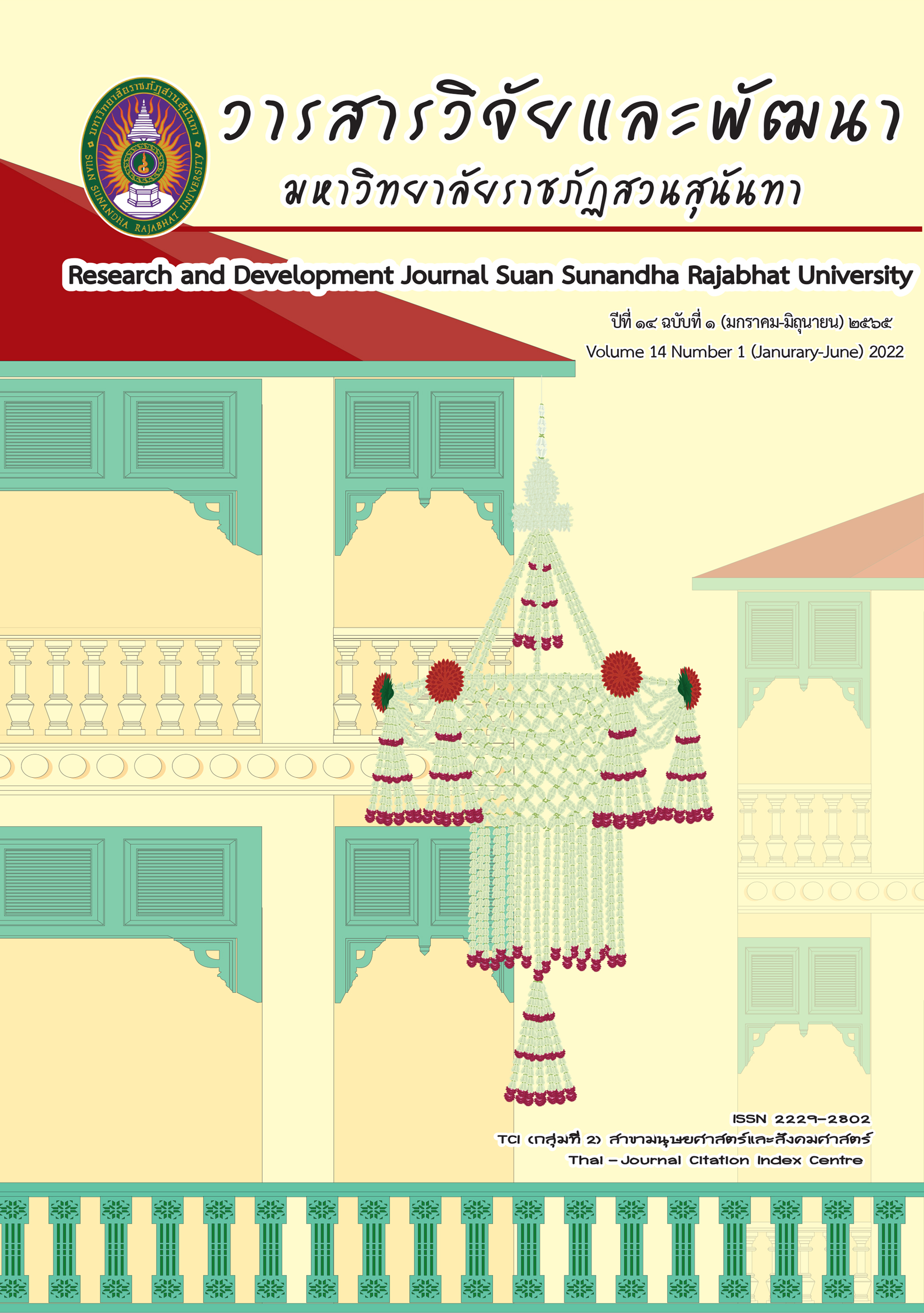การพัฒนากระบวนการจัดการเรียนรู้ตามแนวคิดออร์ฟ ร่วมกับการเรียนรู้แบบสะท้อนคิดเพื่อส่งเสริมความสามารถ ในการจัดการตนเองของนักศึกษาวิชาชีพครู
คำสำคัญ:
ออร์ฟ, การกำกับตนเอง, การคิดไตร่ตรอง, นักศึกษาครุศาสตร์, สวนสุนันทาบทคัดย่อ
งานวิจัยนี้มีวัตถุประสงค์เพื่อออกแบบและพัฒนากระบวนการจัดการเรียนรู้ตามแนวคิดออร์ฟร่วมกับการเรียนรู้แบบสะท้อนคิดเพื่อส่งเสริมความสามารถในการจัดการตนเองของนักศึกษาวิชาชีพครู และเพื่อศึกษาประสิทธิผลของกระบวนการจัดการเรียนรู้ที่พัฒนาขึ้น โดยใช้แบบประเมินคุณภาพของกระบวนการจัดการเรียนรู้สำหรับผู้เชี่ยวชาญ แผนการจัดการเรียนรู้ และแบบรายงานความสามารถในการจัดการตนเองสำหรับนักศึกษา ทั้งนี้คณะผู้วิจัยเริ่มจากการศึกษาและสังเคราะห์แนวคิดการเรียนรู้ พัฒนากระบวนการเรียนรู้ขึ้น นำไปให้ผู้เชี่ยวชาญตรวจสอบคุณภาพ และนำไปทดลองใช้กับนักศึกษาชั้นปีที่ 4 สาขาวิชาสังคมศึกษา คณะครุศาสตร์ มหาวิทยาลัยราชภัฏสวนสุนันทา จำนวน 62 คน เป็นเวลา 20 ชั่วโมง โดยทำการวัดความสามารถด้านการจัดการตนเองของผู้เรียนก่อนและหลังเรียน ผลการวิจัยพบว่า 1. กระบวนการจัดการเรียนรู้ตามแนวคิดออร์ฟและการเรียนรู้แบบสะท้อนคิดเพื่อส่งเสริมความสามารถในการจัดการตนเอง ประกอบด้วย 1) หลักการเรียนรู้ 3 ประการ ได้แก่ หลักการเรียนรู้ภายนอกเชื่อมโยงภายใน หลักการเรียนรู้ร่วมกัน และหลักการเรียนรู้เพื่อการเปลี่ยนแปลงตนเอง 2) จุดมุ่งหมายของกระบวนการจัดการเรียนรู้ คือ เพื่อส่งเสริมการรู้เท่าทันตนเอง ความตระหนักในการอยู่ร่วมกัน การควบคุมตนเอง และการปรุงปรุงหรือพัฒนาตนเอง 3) ขั้นตอนการจัดการเรียนรู้ แบ่งเป็นขั้นสำรวจ ขั้นสร้างผลงาน และขั้นจัดแสดง 4) การวัดประเมินผลใช้วิธีการประเมินตามสภาพจริง 2. ความสามารถในการจัดการตนเองของนักศึกษาวิชาชีพครูหลังเรียนด้วยกระบวนการจัดการเรียนรู้ที่พัฒนาขึ้น (=4.22, S.D.=1.33) สูงกว่าก่อนเรียน (=3.75, S.D.=1.09) มีความก้าวหน้าเฉลี่ยร้อยละ 9.40 แต่ต่ำกว่าระดับพึงพอใจที่กำหนดไว้ร้อยละ 25
เอกสารอ้างอิง
Amarak, S. (1999). Basic Theory of Music. Bangkok: Odeon Store (In Thai).
CASEL. (2019). Core SEL Competencies. Retrieved from https://casel.org/core-competencies
Colleen, M. (1996). Reflecting on Practice: Student Teachers' Perspectives. Flaxton, Qlld: Post Pressed.
Dewey, J. (1933). How We Think: A Restatement of the Relation of Reflective Thinking to the Educative Process. Boston MA: D.C. Heath & Co Publishers.
Dulnakij, C. (2013). Effects of Using Doraemon Manga with Reflective Thinking to Create Awareness of Commitment to Work of Sixth Grade Students. A Thesis for the Degree of Master of Education, Faculty of Education. Chulalongkorn University (In Thai).
Freshwater, D., Taylor, B., & Sherwood, G. (. (2008). International Textbook of reflective Practice in Nursing. Oxford: Blackwell Publishing & Sigma Theta Tau Press.
Goleman, D. (1998). What makes the leader? Harvard Business Review, 76(6), 93-104.
Goodkin, D. (2001). Orff-Schulwerk in the new millennium. Music Educators Journal, 88(3), 17-23.
Goodkin, D. (2013). Play, sing, and dance: An introduction to Orff Schulwerk. New York: Schott Music Corporation.
Hartmann, W. (2017). The Principles of Orff-Schulwerk. International Orff-Schulwerk Forum Salzburg.
Karunasawat, K. (2013). The Development of Instructional Process in Social Studies by Integrating the Other 3R’s Problem Solving Model and Learning Management Principles to Enhance Self-management Competency of Students in Vocational Certificate Programs A Dissertation for the D. Faculty of Education, Chulalongkorn University (In Thai).
Knowles, J. G., Cole, A. L., & Presswood, C. S. (1994). Through preservice Teachers’ Eye: Exploring Field Experiences Through Narrative and Inquiry. New York: Merrill.
Laithong, C. (2017). Effect of Using Exercises Based on Carl Orff’s Approach to Develop Rhythmic Understanding in Elementary School Band Students. A Thesis for the Degree of Master of Education. Faculty of Education, Chulalongkorn University (In Thai).
Laithong, W. (2018). usic Accompaniment Using Drone Based on Orff Schulwerk. Journal of Education Studies Chulalongkorn University, 46(4), 355-367 (In Thai).
Likert, R. (1932). A technique for the measurement of attitudes. Archives of psychology, 22(140), 1-55.
Lopez-Ibor, S. (2011). Teaching the whole child through music: Visual arts. CA: Pentatonic Press.
Magee, W. L., & Davidson, J. W. (2002). The Effect of Music Therapy on Mood States in Neurological Patients: A Pilot Study. Journal of Music Therapy, 39(1), 20-9.
Narkwong, T. (1999). Carl Orff’s Music Teaching. Bangkok: Kasetsart University (In Thai).
Pelletier, C. L. (2004). The Effect of Music on Decreasing Arousal Due to Stress: A Meta-Analysis. Journal of Music Therapy, 41(3), 192–214.
Pintrich, P. R., & De Groot, E. V. (1990). Motivational and Self-regulated Learning Components of Classroom Academic Performance. Journal of Educational Psychology, 82(1), 33-40.
Ritcharoon, P. (2004). Research Methodology in Social Science. Bangkok: House of Kermyst (In Thai).
Schon, D. (1983). The Reflective Practitioner. New York: Basic Books.
Standley, J. M. (1996). A Meta-Analysis on the Effects of Music as Reinforcement for Education. Therapy Objectives. doi:10.2307/ 3345665
Sutthjit, N. (2001). Music Teaching Behavior. Bangkok: Chulalongkorn University (In Thai).
Zimmerman, B. J. (2008). Investigating Self-Regulation and Motivation: Historical Background, Methodological Developments, and Future Prospects. American Educational Research Journal, 45(1), 166-183.
ดาวน์โหลด
เผยแพร่แล้ว
รูปแบบการอ้างอิง
ฉบับ
ประเภทบทความ
สัญญาอนุญาต
ลิขสิทธิ์ (c) 2022 มหาวิทยาลัยราชภัฏสวนสุนันทา

อนุญาตภายใต้เงื่อนไข Creative Commons Attribution-NonCommercial-NoDerivatives 4.0 International License.
บทความที่ได้รับการตีพิมพ์เป็นลิขสิทธิ์ของ สถาบันวิจัยและพัฒนา มหาวิทยาลัยราชภัฎสวนสุนันทา
ข้อความที่ปรากฏในบทความแต่ละเรื่องในวารสารวิชาการเล่มนี้เป็นความคิดเห็นส่วนตัวของผู้เขียนแต่ละท่านไม่เกี่ยวข้องกับมหาวิทยาลัยราชภัฎสวนสุนันทา และคณาจารย์ท่านอื่นๆในมหาวิทยาลัยฯ แต่อย่างใด ความรับผิดชอบองค์ประกอบทั้งหมดของบทความแต่ละเรื่องเป็นของผู้เขียนแต่ละท่าน หากมีความผิดพลาดใดๆ ผู้เขียนแต่ละท่านจะรับผิดชอบบทความของตนเองแต่ผู้เดียว





